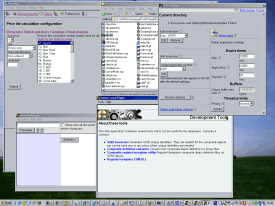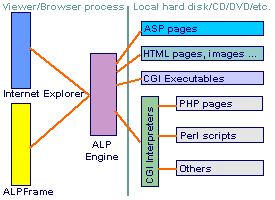| NEWS AND ANNOUNCEMENTS |
|
New version
 Active Local Pages 1.5 beta
is here. The beta binaries are stable enough to be used in production environment. Both the current official version (1.2) and the new
1.5 are Windows Vista compatible (with bot 32 bit and 64 bit versions). Active Local Pages 1.5 beta
is here. The beta binaries are stable enough to be used in production environment. Both the current official version (1.2) and the new
1.5 are Windows Vista compatible (with bot 32 bit and 64 bit versions).
|
For The Developers
 SQLite3 COM databasse
component is around for some years, it is now packed with ALP 1.5 beta, so you do not need to fetch it separately.
If you do not know SQLite3 COM is quite different, it supports parametrized queries and most importantly - session parameters which allow
the embedded database to show its teeth! SQLite3 COM databasse
component is around for some years, it is now packed with ALP 1.5 beta, so you do not need to fetch it separately.
If you do not know SQLite3 COM is quite different, it supports parametrized queries and most importantly - session parameters which allow
the embedded database to show its teeth!
|
Do you know?
You can evaluate Active Local Pages, perform tests, even complete a project before you buy.
ALP does not expire!
|
newObjects Active Local Pages (ALP)
 What
is ALP? What
is ALP?
Active Local Pages combines the power of WEB programming and desktop programming in one.
Without need of anything else than Microsoft Internet Explorer® installed on
the machine ALP can power wide range of applications built for it or ported from
Microsoft Internet Information Server® and run them not depending on any
network functionality, server software and administrator efforts. The applications for
ALP are written just like WEB applications, but they run as desktop
applications. Still, ALP is not a WEB server, it is not disturbed by firewalls,
it does not require users or administrators to perform configuration tasks..
Programs powered by ALP
ALP is best for personal and business DB (data base) applications,
productivity and informational tools, encyclopedias, dictionaries, catalogs, PC
management tools, organizer software, business tasks automation and many others.
The ALP programming interface resembles and is compatible with popular WEB programming techniques and
many applications built for WEB servers will also run on ALP as desktop
applications with none or only cosmetic adjustments. Application's Look-And-Feel
may vary from typical WEB-like user interface to typical Windows application interface. The
developers may choose between Microsoft Internet Explorer® or ALPFrame
browser as their application front-end and thus benefit of typical WEB page
look-and-feel (IE) or combine WEB and typical Windows application user interface
features (ALPFrame) - whichever is best for every particular project.
Is ALP right for me and my company?
Most likely yes. In many areas ALP is easier to use as platform than a
typical form-based Rapid Application Development environment. ALP offers more
flexibility than the most development environments and is simple enough
even for beginners. ALP ships with Run-time library that allows the developers
access wide range of features and tools relying only on ALP's own components, but ALP
is also open environment and the applications for it can integrate with almost
any other known Windows software or use alternative components from other
vendors. The ALP's own components depend on nothing
else than IE and the applications for ALP can be built to run on any Windows
system not depriving them of features such as SQL database functionality,
networking, powerful file access mechanisms and many others. On the other hand
ALP applications can be built to cooperate or integrate with the other
software you already run to extend your IT infrastructure. Thus the ALP
applications can serve both - be a part of your office/organization
infrastructure or be as independent as theoretically possible and deploy easily
on any Windows machine.
 So,
how ALP works? So,
how ALP works?
ALP implements WEB programming interfaces compatible with Active Server
Pages (ASP compatible pages) and CGI (Common Gateway Interface) from which ASP
is the primary programming interface for ALP. ALPFrame browser/viewer (mentioned above) is based on Microsoft Internet Explorer® but extends
its DHTML programming model with window and context menus, advanced application
window control and more. You can think of it as of a 'browser' designed in a bit
different way - its look and user interface details are dynamic and fully
controllable by the application in contrast to the traditional WEB browsers.
That is why it has no substantial default user interface elements - the
applications create and show them as they need them.
ALP engine consist of a core DLL and module DLL. They load into the browser
process whenever an ALP URL is requested and they fetch/execute the resources from your local storage drives. WEB servers do this on a server and
receive/respond to requests from the browser through TCP/IP. ALP, in contrast,
does this directly. The functional effect is like you have an embedded WEB
server in the running browser (IE or ALPFrame) instance. ALP supports directly
ASP and CGI (with some limitations) and through CGI interpreters many other
programming interfaces. The visual enhancements based on the ALPFrame features
are completely DHTML (browser side) controlled, therefore they can be used from
any application no matter what programming interface is used.
Various highlights
The software developers can employ their existing skills in WEB
software development areas in totally new area - desktop software, autorun
aplications (on CDs, flash memory and other removable media), combined desktop/online applications. As long as it makes sense you can just get one of
your online applications and adjust it to run under ALP and then distribute
it to the users. You can write code that will run on stand-alone PCs and WEB
server without changes. Even without these benefits many people will agree
that WEB programming (ASP pages for example) is much easier than a typical
RAD tool (form based for example) for quite many applications. ALP needs
very little in order to run you will discover that an ALP applications will
need re-distributable files much less in size and much less troublesome on the
various Windows versions. Through COM you can use almost any available ActiveX
built for ASP pages and thus you have access to a huge library of additional
components from many different vendors that may help you add almost any
imaginable feature in your application. The COM interface allows also the ALP based
projects gain access to the other applications on the system - they can
cooperate with MS Office applications, local and intranet database and
application servers, perform tasks that are part of the entire information flow
in your organization.
With the autorun support you can adapt or write many applications to run just
from a CD/DVD or a flash memory card/drive without initial setup. Active Local Pages ships with a very
advanced run-time library (known also as newObjects ActiveX pack1
family) which gives
you ability to rely on ALP base components for wide variety of tasks and thus
avoid any additional dependencies that may rise the size and complexity of the
redistribution packages. Through this library you have access to many system
features otherwise known to be accessible only for C++ or Delphi applications -
for example you can even run threads in the background and communicate with them
asynchronously from your front ASP pages.
How hard is it to write something in ALP? If you have WEB
programming skills in ASP or CGI you do not have much to learn in order to begin. Of course,
you must get used with the ALP specific features, get used to the way the
applications are distributed (for example, in contrast with a WEB server you
must take care to redistribute the 3-d party components if you use such). However, an ASP developer will find ALP
very close to the classic ASP and most of the differences are obvious consequence of the fact that the ALP applications run locally and not on a
server - something you can guess even before reading about it in the
documentation.
End-users. You may even already have some ALP applications and not
know about them. There are two general types of software consuming schemes:
Obtaining software that is built and exposed/sold to anyone who may need it and
Ordering software development of specific application(s) you or your
organization needs for internal usage or wants to distribute or sell.
In the first case you can download ALP applications and you will need the ALP
engine to run them. They may have it embedded in their redistribution package or
my be packed without it to reduce the download size. In the second case you may consider ALP as cost effective way to create and
use software tools for your business. If it is small you need just a few cheap
ALP LOCAL (per-seat) licenses for your workstations, if you want to build software for the market
you buy DEVELOPER license once and there are no additional fees - not based on development
workstations, nor based on the number of the applications, nor based on the way
and volume of the distributed packages!
How much it costs?
newObejcts Active Local Pages is licensed in very simple manner. There
are two base license types only.
First there is a per-seat based license which is referred as LOCAL
license through the documentation. It licenses ALP engine for one machine to run
any compatible application. It is NOT a re-distribution license. It is mostly
for small companies and individuals who need full freedom to run anything on
their machines. The license permits you install ALP not only on a single PC, but
also on all the personal devices you use beside it - such as laptop or PDA (when
the PDA version becomes available).
The DEVELOPER license is for re-distribution of applications with ALP
(or without it - any suitable way the developer may choose). It is embedded in
the applications so the end-users do not need to obtain LOCAL license in order to
use the application - no matter if the application is packed with ALP engine or ALP is
downloaded separately. It applies and travels only with the applications in which it is
embedded. One developer license allows any number of different applications to be built
and re-distributed as appropriate on behalf the developer
(company/organization/individual) who owns the license. This, of course,
includes in-door usage of such applications in your organization.
Read more about the licensing and the prices on the Buy ALP
page.
We aim at a simple licensing scheme which will not involve the
developers in boring licensing arrangements each time they need to extend their
business. We hope this saves your time and our time for much better purposes ;).
|